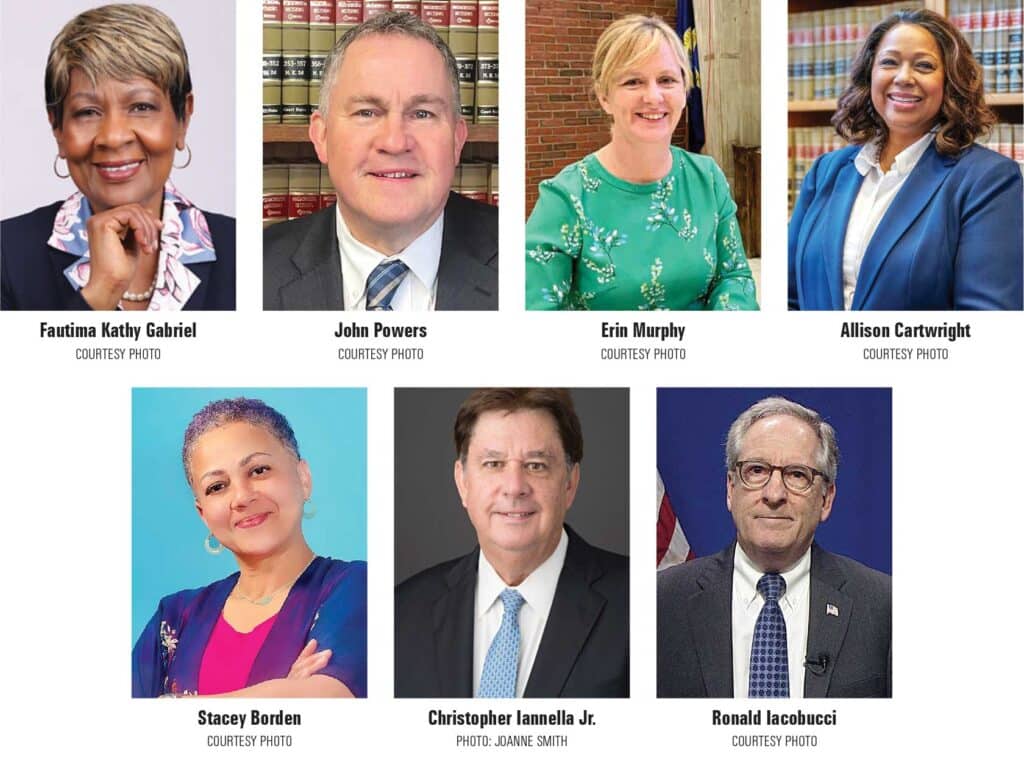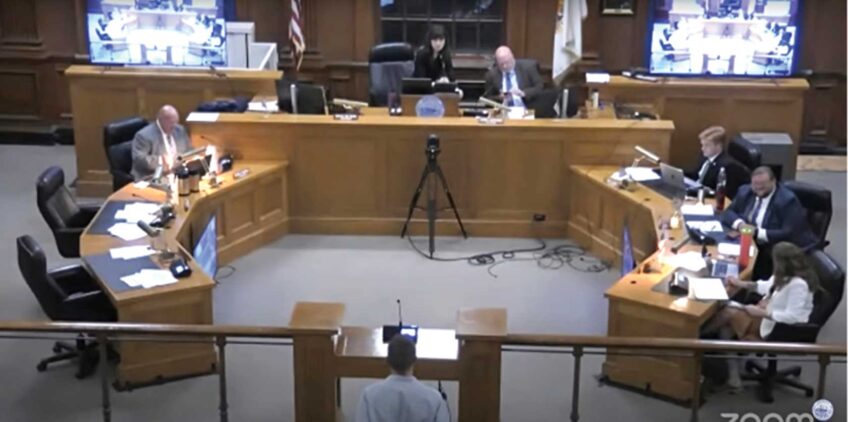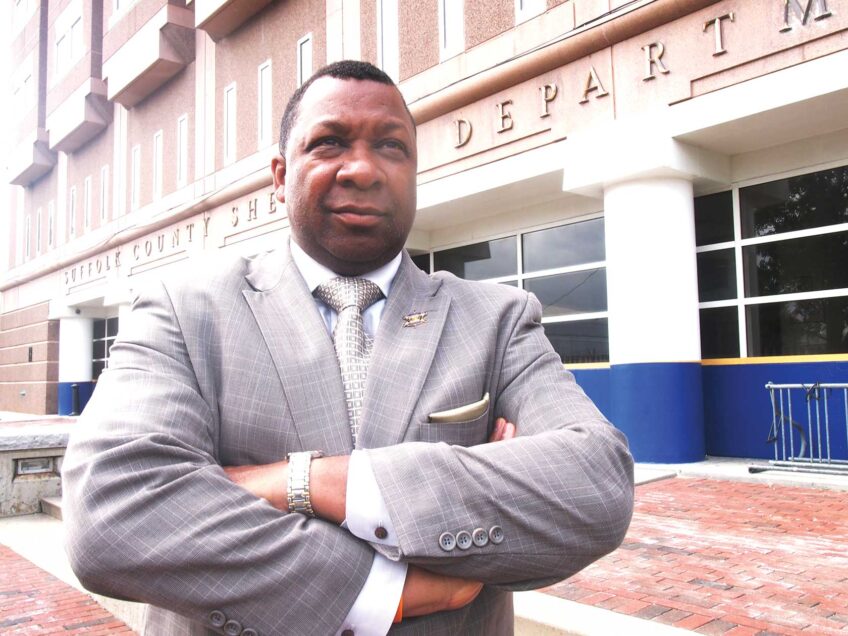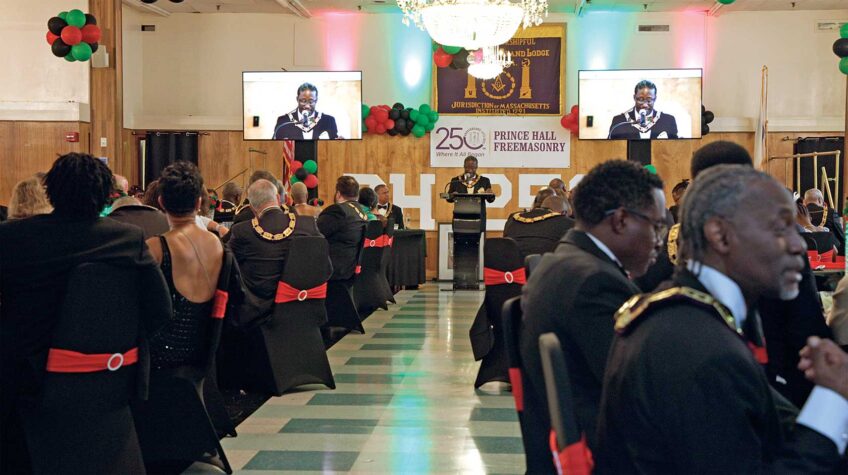
On August 14, seven Democratic candidates vying for three positions on the Governor’s Council, the Clerk of Court for Civil Business, and the Clerk of the Supreme Judicial Court met at the Lena Park Community Center to debate the issues ahead of the primary on September 3.
Governor’s Council
The first debate of the evening concerned the Governor’s Council race, pitting incumbent Christopher Iannella Jr. against two challengers: Stacey Borden, a mental health advocate who is executive director of New Beginnings Reentry Services, Inc., and Ronald Iacobucci, a Quincy resident who is executive director of Quincy’s Workforce Development Department.
The Massachusetts Governor’s Council is a group of eight elected individuals and the lieutenant governor, who make recommendations on various decisions relating to judicial appointments, commendations, clerk-magistrates, public administration hires, and contracting boards serving the state.
Borden said she was a formerly incarcerated woman who now has a master’s degree in mental health from Cambridge College and is a mental health and drug addiction counselor in Boston. Her experience, she explained, has given her “firsthand insight into the challenges and needs of individuals reintegrating into society.” She has dedicated her life “to helping others — from fighting for prisoners’ rights to addressing wrongful convictions.”
Lacobucci, a Quincy resident with a master’s degree in public administration, said he is running because he believes that Council members need to be more accessible to their constituents, and his experience as a City Hall manager for Mayor Kevin White will help him as a Governor’s Council member. He wants more transparency in the Governor’s Council.
The candidates were asked how they will pick judges and what are the criteria for their employment.
Iannella said he believes temperament is one of the most important factors he considers in a judge. “Judicial temperament, I think, is really important [and] trial experience and character,” he said. “I want to know what this person is all about. Tell me something about you. I want to know about their demeanor. … Because at the end of the day, when you go to court, you want to leave that courtroom saying to yourself, ‘I gotta fair shake.’”
“I think the importance of vetting a judge is really to find out why they want to be a judge,” said Borden. “What is their background? Are they coming from corporate America? Are they coming from the perspective of mental health? Do they know anything about Black and brown, poor communities? Are they going to humanize people [who] go in front of them? We need some important questions answered.”
Iacobucci said the problem is that these nominees come to us through a process, and “effort and energy have to be given to the beginning of the process to make sure that we’re attracting the right candidates. The Council needs to be more proactive and look at opportunities at the beginning and not just at the end.” He also wants the Governor’s Council to educate the public about how important its role is in the judicial system, especially the pardon system. “How will you handle marijuana pardons?” Iacobucci asked. “We have to be more accountable.”
Suffolk County Clerk of Courts for Civil Business
The second debate focused on the Suffolk County Clerk of Courts for Civil Business, with challenger Fautima Kathy Gabriel opposing John Powers, an attorney who is running for reelection.
The superior court clerk for civil business is the court’s record keeper, filing and maintaining judicial documents regarding civil cases. The clerk oversees filings, collects fees, and may administer oaths.
Powers touted his many years of service in the court system, notably in the Suffolk County District Attorney’s Office and the Civil Clerk’s Office, where he processed hundreds of cases coming before the court.
Gabriel, a community activist from Boston, said she became politically active after emigrating from the Island of Trinidad and Tobago, when she started working in the Mayor’s Office of Human Rights as an office manager. She has 30 years’ experience as an administrator of Suffolk Superior Court. She said, “I’m running for this office to ensure the court has a welcoming environment for all people, which includes the most vulnerable.”
The candidates were asked about office diversity, technological problems and customer service.
Gabriel said there was a lack of diversity in the office, to which Powers responded, “I have 37 employees and, by my count, 48% are people of color. And [if] you walk into our clerk’s office, you’re welcome to see somebody who looks like you, and that’s important.”
“Yes, as you walk into the court, you will find the levels of diversity, but that’s where it ends,” Gabriel countered. “At a higher level, you don’t find that diversity. So, it is my belief that you need to have that kind of diversity within the whole court system. We also need judges that will reflect our community.”
Candidates also answered questions about the speed and efficiency of the court system.
Powers said, “We’re dealing with the after-effects of Covid, where we shut down, and so we have a backlog of trials. We’ve also had the challenge of not having enough court judges. According to our court, we were down a few weeks ago to 12 security board judges statewide. As a result, we encourage mediation. We order some judicial settlement conferences.”
Gabriel explained that they had quick training upon entering the court as an administrator.
“I know when I started, you got like a crash course back then; we need to invest more into training, especially on the customer service level and helping other people come into court,” she said.
“The COVID-19 pandemic was a crisis that was scary, and not a lot of good came out of [it],” Powers said. “But … it forced us to do our work differently. We introduced remote areas. We never had that five years ago. Electronic funding, for instance, we’ve got the ability for people to listen to their court hearings on audio instead of having a lot of transcripts, so we are getting tools that allow us to do our job better. The problem is its technology. It’s expensive.”
Clerk of Supreme
Judicial Court
The last race, for Clerk of Supreme Judicial Court for Suffolk County, was the most contentious of all three. The SJC clerk is the court’s record keeper, filing and maintaining judicial documents. The clerk also oversees filings and collects fees for the Supreme Judicial Court’s trial court docket cases, and for matters relating to members of the Massachusetts bar.
Maura Doyle, the incumbent, is not seeking reelection.
Erin Murphy, an at-large member of the Boston City Council, is seeking her first term as SJC clerk, as is Allison Cartwright, an attorney who presently serves as managing director of the Committee for Public Counsel Services.
One question posed to the two candidates was whether a law degree is needed to do the job.
Cartwright said it does, explaining that she has been a public defender for all of her career and has traveled all over the state. She also said “the minimum requirements were that you had to hold a Juris Doctor, that is, a law degree. You had to be a member of the bar, and you had to have been a member of the bar in good standing for at least ten years.”
Murphy does not believe that having a J.D. is necessary for the job. “Many clerks aren’t attorneys,” she said. “I think my experience is more than what is needed for this role. I’m a legislator in the city of Boston. I’ve been there for several years. I have support all across the city because people know that I’m going to listen, I’m going to care, and I’m going to pay attention to detail.”
Cartwright said, “This is a job interview, Let’s make no mistake about that. Maura Doyle was an attorney for well over 20 years before she became [SJC] clerk, and she served in that position for almost three years.”
Both candidates expressed their views on the issue of people navigating through the court system.
Murphy said, “I know one thing that the SJC is doing. What Clerk Doyle took on was to digitize all of the records. And managing is something I’ve done my whole life. … Under my leadership, it won’t matter what you look like, what degree you have, what neighborhood you live in, what language you speak. We all deserve a fair shot.”
Cartwright closed by talking about her record. “I have won well over 90% of the cases I have tried,” she said. “Why? Because I put in the work. There are no shortcuts. It is not just an administrative job. It is a job that requires a depth of legal knowledge and understanding of the rules and procedures and what needs to be done in a professional and efficient manner, and that’s what I will bring as your next clerk of the Supreme Judicial Court.”
The Massachusetts primaries will be held statewide on September 3, and polling hours are from 7 a.m. to 8 p.m. Early voting for eligible voters has begun and will continue through primary day.






